Schild's Ladder Read online
Schild's Ladder
Egan, Greg
HarperCollins (2003)
* * *
* * *
SUMMARY:
Twenty thousand years into the future, an experiment in quantum physics has had a catastrophic result, creating an enormous, rapidly expanding vacuum that devours everything it comes in contact with.Now humans must confront this deadly expansion. Tchicaya, aboard a starship trawling the border of the vacuum, has allied himself with the Yielders -- those determined to study the vacuum while allowing it to grow unchecked. But when his fiery first love, Mariama, reenters his life on the side of the Preservationists -- those working to halt and destroy the vacuum -- Tchicaya finds himself struggling with an inner turmoil he has known since childhood.However, in the center of the vacuum, something is developing that neither Tchicaya and the Yielders nor Mariama and the Preservationists could ever have imagined possible: life.
SCHILD'S LADDER
Greg Egan
Thanks to John Baez, Jennifer Brehl, Caroline Oakley, Anthony Cheetham, John Douglas, Simon Spanton, Oisín Murphy-Lawless, Devi Pillai, Peter Robinson, Russell Galen, Carol Jackson, Emma Bailey, Diana Mackay, Philip Patterson, Christodoulos Litharis, Nicola Fantini, Giancarlo Carlotti, Albert Solé, Petr Kotrle, Makoto Yamagishi, Florin Pîtea, and Mihai-Dan Pavelescu.
Contents
Part One
Chapter 1
In the beginning was a graph, more like diamond than graphite.…
Chapter 2
Riding her ion scooter the million kilometers to the Quietener,…
Chapter 3
Cass looked around the simulated chamber. The display on…
Part Two
Chapter 4
By choice, Tchicaya's mind started running long before his…
Chapter 5
The shuttle separated from the Rindler, sending Tchicaya's…
Chapter 6
Something unseen stung Tchicaya's hand, a vibration like a…
Chapter 7
Sophus was far too tactful to ask Tchicaya how he and Mariama…
Chapter 8
Yann rolled off the bed and landed on the floor, laughing.…
Chapter 9
“Everyone complains about the laws of physics, but no one…
Chapter 10
“I've already designed the vehicle you're looking for,” Yann…
Chapter 11
Tchicaya said, “We should tell them, now! Take them all the…
Chapter 12
“It looks as if the Colosseum is about to welcome us in,”…
Chapter 13
Tchicaya's Mediator woke him. It had just received a messenger…
Chapter 14
When the first, paralyzing wave of despair had left him, Tchicaya…
Chapter 15
Tchicaya looked out from the Sarumpaet into a lime-green sea.…
Chapter 16
Tchicaya looked down through the panes in the floor into a…
Chapter 17
The Sarumpaet circumnavigated the xennobe colony, reconnoitering,…
Chapter 18
Time was everything, and Tchicaya felt a streak of brutal…
References
About the Author
Other Books by Greg Egan
Cover
Credits
Copyright
About the Publisher
Part One
Chapter 1
In the beginning was a graph, more like diamond than graphite. Every node in this graph was tetravalent: connected by four edges to four other nodes. By a count of edges, the shortest path from any node back to itself was a loop six edges long. Every node belonged to twenty-four such loops, as well as forty-eight loops eight edges long, and four hundred and eighty that were ten edges long. The edges had no length or shape, the nodes no position; the graph consisted only of the fact that some nodes were connected to others. This pattern of connections, repeated endlessly, was all there was.
In the beginning? Waking more fully, Cass corrected herself: that was the version she remembered from childhood, but these days she preferred to be more cautious. The Sarumpaet rules let you trace the history of the universe back to the vicnity of the Diamond Graph, and everything you could ask for in a Big Bang was there: low entropy, particle creation, rapidly expanding space. Whether it made sense to follow these signposts all the way back, though, was another question.
Cass let the graph's honeycomb pattern linger in the darkness of her skull. Having relinquished her child's-eye view of the world, she was unable to decide which epoch of her life she actually inhabited. It was one of the minor perils of longevity: waking could be like to trying to find your way home on a street with ten thousand houses, all of which had once been your own. That the clues on the other side of her eyelids might be more enlightening was beside the point; she had to follow the internal logic of her memories back into the present before she could jolt herself awake.
The Sarumpaet rules assigned a quantum amplitude to the possibility of any one graph being followed by another. Among other things, the rules predicted that if a graph contained a loop consisting of three trivalent nodes alternating with three pentavalent ones, its most likely successors would share the same pattern, but it would be shifted to an adjoining set of nodes. A loop like this was known as a photon. The rules predicted that the photon would move. (Which way? All directions were equally likely. To aim the photon took more work, superimposing a swarm of different versions that would interfere and cancel each other out when they traveled in all but one favored direction.)
Other patterns could propagate in a similar fashion, and their symmetries and interactions matched up perfectly with the known fundamental particles. Every graph was still just a graph, a collection of nodes and their mutual connections, but the flaws in the diamond took on a life of their own.
The current state of the universe was a long way from the Diamond Graph. Even a patch of near-vacuum in the middle of interstellar space owed its near-Euclidean geometry to the fact that it was an elaborate superposition of a multitude of graphs, each one riddled with virtual particles. And while an ideal vacuum, in all its complexity, was a known quantity, most real space departed from that ideal in an uncontrollable manner: shot through with cosmic radiation, molecular contaminants, neutrinos, and the endless faint ripple of gravitational waves.
So Cass had traveled to Mimosa Station, half a light-year from the blue subgiant for which it was named, three hundred and seventy light-years from Earth. Here, Rainzi and his colleagues had built a shield against the noise.
Cass opened her eyes. Lifting her head to peer through a portal, still strapped to the bed at the waist, she could just make out the Quietener: a blue glint reflecting off the hull a million kilometers away. Mimosa Station had so little room to spare that she'd had to settle for a body two millimeters high, which rendered her vision less acute than usual. The combination of weightlessness, vacuum, and insectile dimensions did make her feel pleasantly robust, though: her mass had shrunk a thousand times more than the cross sections of her muscles and tendons, so the pressures and strains involved in any collision were feather-light. Even if she charged straight into a ceramic wall, it felt like being stopped by a barricade of petals.
It was a pity the same magical resilience couldn't apply to her encounters with less tangible obstacles. She'd left Earth with no guarantee that the Mimosans would see any merit in her proposal, but it was only in the last few days that she'd begun to face up to the possibility of a bruising rejection. She could have presented her entire case from home, stoically accepting a sevenhundred-and-forty-year delay between each stage of the argument. Or she could have sent a Surrogate, well briefed but nonsentient, to pl
ead on her behalf. But she'd succumbed to a mixture of impatience and a sense of proprietorship, and transmitted herself blind.
Now the verdict was less than two hours away.
She unstrapped herself and drifted away from the bed. She didn't need to wash, or purge herself of wastes. From the moment she'd arrived, as a stream of ultraviolet pulses with a header requesting embodiment on almost any terms, the Mimosans had been polite and accommodating; Cass had been careful not to abuse their hospitality by pleading for frivolous luxuries. A self-contained body and a safe place to sleep were the only things she really needed in order to feel like herself. Being hermetically sealed against the vacuum and feeding on nothing but light took some getting used to, but so did the customs and climate of any unfamiliar region back on Earth. Demanding the right to eat and excrete, here, would have been as crass as insisting on slavish recreations of her favorite childhood meals, while a guest at some terrestrial facility.
A circular tunnel, slightly wider than her height, connected her spartan quarters to a chamber where she could interact with the software she'd brought from Earth, and through it the Mimosans themselves. She bounced down the borehole, slapping the wall with her hands and feet, bumping her head and elbows deliberately.
As she entered the chamber, she seemed to emerge from the mouth of a burrow to float above a lush, wide meadow beneath a cloud-dappled sky. The illusion was purely audiovisual—the sounds encoded in radio waves—but with no weight to hold her against the ceramic hidden beneath the meadow, the force of detail was eerily compelling. It only took a few blades of grass and some chirping insects to make her half-believe that she could smell the late-summer air.
Would it really have been an act of self-betrayal, if this landscape had stretched all the way inside her—right down to the sensations of inhabiting her old, two-meter body, gorging on a breakfast of fruit and oats after swimming across Chalmers Lake? If she could drift in and out of this soothing work of art without losing her grip on reality, why couldn't she take the process a few steps further?
She pushed the argument aside, though she was glad that it never stopped nagging at her. When the means existed to transform yourself, instantly and effortlessly, into anything at all, the only way to maintain an identity was to draw your own boundaries. But once you lost the urge to keep on asking whether or not you'd drawn them in the right place, you might as well have been born Homo sapiens, with no real choices at all.
A short distance from the burrow stood a marble statue of Rainzi, arms folded, smiling slightly. Cass gestured at the messenger and it came to life, the white stone taking on the hue and texture of skin. Rainzi himself was several generations removed from anyone who'd bothered to simulate a living dermis, let alone possess one, but Cass was not equipped to make sense of the Mimosans' own communications protocols, so she'd chosen to have everything translated into the visual dialect used back on Earth.
“We'll give you our decision at nine o'clock, as promised,” the messenger assured her. “But we hope you won't mind if we precede this with a final review session. Some of us feel that there are matters that have yet to be entirely resolved. We'll begin at half past seven.” The messenger bowed, then froze again, expecting no reply.
Cass tried not to read too much into the sudden change of plan. It was unnerving to discover that her hosts still hadn't been able to reach a verdict, but at least they weren't going to keep her waiting any longer than she'd expected. The fact that she'd alread briefed them in detail on every aspect of the experiment that had crossed her mind during three decades of preparation, and they now hoped to hear something new and decisive from her in twenty minutes' time, was no reason to panic. Whatever loose ends they'd found in her analysis, they were giving her the chance to put things right.
Her confidence was shaken, though, and she couldn't stop thinking about the prospect of failure. After a month here, she still wasn't lonely, or homesick; that was the price she'd pay upon returning. Even at the leisurely pace of the embodied, seven hundred and forty years cut a deep rift. It would be millennia before the changes that her friends on Earth had lived through together would cease to set her apart from them. Millennia, if ever.
She still believed that she could come to terms with that loss, so long as she had something to weigh against it. Being a singleton meant accepting that every decision had its cost, but once you understood that this state of affairs was a hard-won prize, not a plight to rail against, it gave some dignity to all but the most foolish choices.
If the Mimosans turned her down, though? Maybe there was something daring and romantic in the mere act of traveling hundreds of light-years, inhabiting the body of a vacuum-dwelling insect, and alienating herself from the world where she belonged, all in the hope of seeing her ideas tested as rapidly as possible. But for how long would she be able to take comfort from the sheer audacity of what she'd done, once that hope had come to nothing?
She curled into a ball and tried to weep. She could not shed tears, and the sobs rebounding against her membrance-sealed mouth were like the drone of a mosquito. But the shuddering as she worked her vestigial lungs still provided some sense of release. She had not entirely erased the map of her Earthly body from her mind; too much of the way she experienced emotions was bound up in its specific form. So everything she'd amputated lingered as a kind of phantom—nowhere near as convincing as a true simulation, but still compelling enough to make a difference.
When she was spent, Cass stretched out her limbs and drifted over the meadow like a dandelion seed, as calm and lucid as she'd been at any time since her arrival.
She knew what she knew about Quantum Graph Theory, backward. Whatever insights she was capable of extracting from that body of knowledge, she'd extracted long ago. But if the Mimosans had found a question she couldn't answer, a doubt she couldn't assuage, that in itself would be a chance to learn something more.
Even if they sent her home with nothing else, she would not be leaving empty-handed.
It was Livia who asked the first question, and it was far simpler than anything Cass had anticipated.
“Do you believe that the Sarumpaet rules are correct?”
Cass hesitated longer than she needed to, a calculated attempt to imbue her response with appropriate gravity.
“I'm not certain that they are, but the likelihood seems overwhelming to me.”
“Your experiment would test them more rigorously than anything that's been tried before,” Livia observed.
Cass nodded. “I do see that as a benefit, but only a minor one. I don't believe that merely testing the rules one more time would justify the experiment. I'm more interested in what the rules imply, given that they're almost certainly correct.”
Where was this heading? She glanced around at the others, seated in a ring in the meadow: Yann, Bakim, Darsono, Ilene, Zulkifli, and Rainzi. Her Mediator had chosen appearances for all of them, since they offered none themselves, but at least their facial expressions and body language were modulated by their own intentional signals. By choice, they all looked politely interested, but were giving nothing away.
“You have a lot of confidence in QGT?” Clearly, Livia did realize just how strange her questions sounded; her tone was that of someone begging to be indulged until her purpose became apparent.
Cass said, “Yes, I do. It's simple, it's elegant, and it's consistent with all observations to date.” That handful of words sounded glib, but other people had quantified all of these criteria long ago. QGT as a description of the dynamics of the universe with the minimum possible algorithmic complexity. QGT as a topological redescription of some basic results in category theory—a mathematical setting in which the Sarumpaet rules appeared as natural and inevitable as the rules of arithmetic. QGT as the most probable underlying system of physical laws, given any substantial database of experimental results that spanned both nuclear physics and cosmology.
Darsono leaned toward her and interjected, “But why, in your heart”�
�he thumped his chest with an imaginary fist—“are you convinced that it's true?” Cass smiled. That was not a gesture in the staid vocabulary her Mediator used by default; Darsono must have requested it explicitly.
“In part, it's the history,” she admitted, relaxing slightly. “The lineage of the ideas. If some alien civilization had handed us Quantum Graph Theory on a stone tablet—out of the blue, in the eighteenth or nineteenth century—I might not feel the same way about it. But general relativity and quantum mechanics were among the most beautiful things the ancients created, and they're still the best practical approximations we have for most of the universe. QGT is their union. If general relativity is so close to the truth that only the tiniest fragment can be missing, and quantum mechanics is the same...how much freedom can there be to encompass all of the successes of both, and still be wrong?”
Kusnanto Sarumpaet had lived on Earth at the turn of the third millennium, when a group of physicists and mathematicians scattered across the planet—now known universally as the Sultans of Spin—had produced the first viable offspring of general relativity and quantum mechanics. To merge the two descriptions of nature, you needed to replace the precise, unequivocal geometry of classical space-time with a quantum state that assigned amplitudes to a whole range of possible geometries. One way to do this was to imagine carrying a particle such as an electron around a loop, and computing the amplitude for its direction of spin being the same at the end of the journey as when it first set out. In flat space, the spins would always agree, but in curved space the result would depend on the detailed geometry of the region through which the particle had traveled. Generalizing this idea, crisscrossing space with a whole network of paths taken by particles of various spins, and comparing them all at the junctions where they met, led to the notion of a spin network. Like the harmonics of a wave, these networks comprised a set of building blocks from which all quantum states of geometry could be constructed.

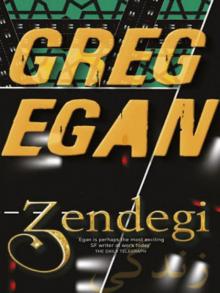 Zendegi
Zendegi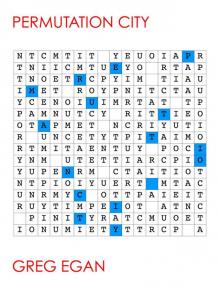 Permutation City
Permutation City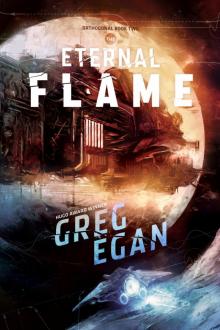 The Eternal Flame
The Eternal Flame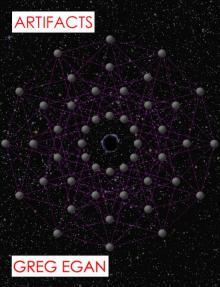 Artifacts
Artifacts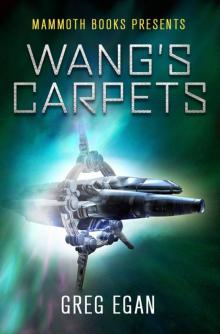 Wang's Carpets
Wang's Carpets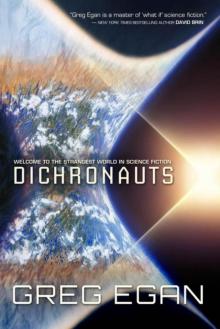 Dichronauts
Dichronauts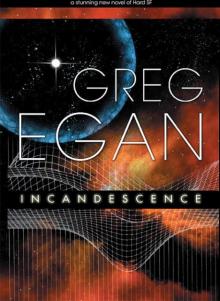 Incandescence
Incandescence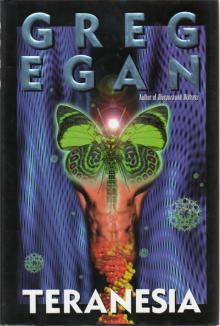 Teranesia
Teranesia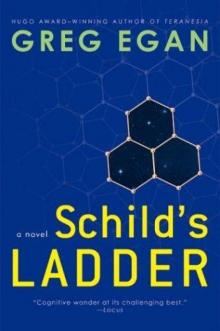 Schild's Ladder
Schild's Ladder Quarantine
Quarantine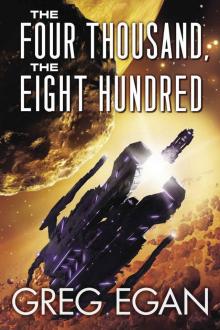 The Four Thousand, the Eight Hundred
The Four Thousand, the Eight Hundred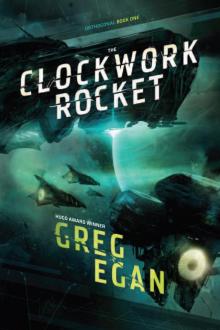 The Clockwork Rocket
The Clockwork Rocket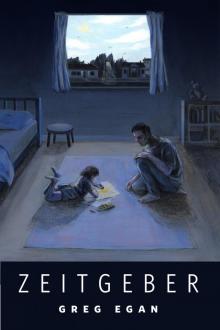 Zeitgeber
Zeitgeber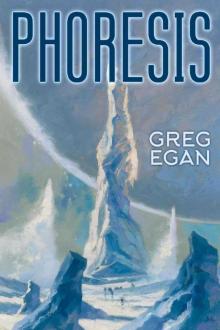 Phoresis
Phoresis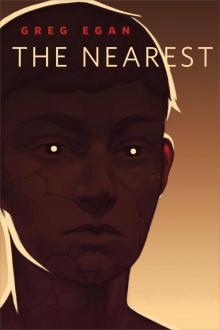 The Nearest
The Nearest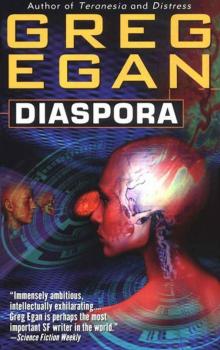 Diaspora
Diaspora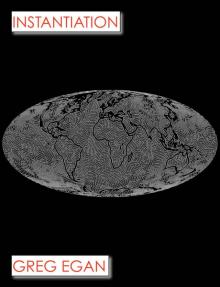 Instantiation
Instantiation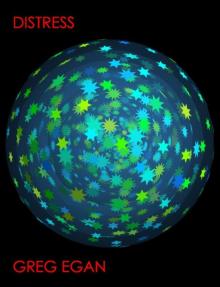 Distress
Distress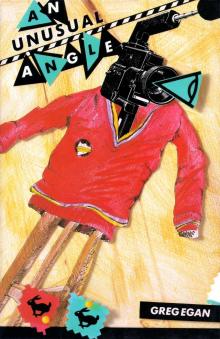 An Unusual Angle
An Unusual Angle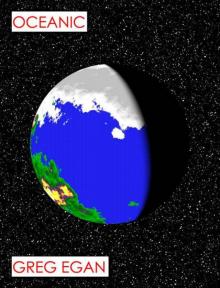 Oceanic
Oceanic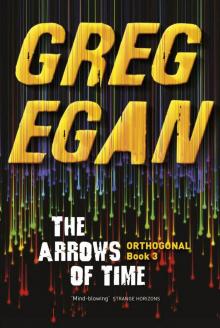 The Arrows of Time
The Arrows of Time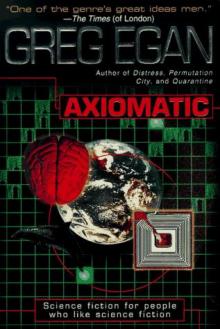 Axiomatic
Axiomatic![Anthology 2. Luminous [1998, 2010] Read online](http://i1.bookreadfree.com/i/03/18/anthology_2_luminous_1998_2010_preview.jpg) Anthology 2. Luminous [1998, 2010]
Anthology 2. Luminous [1998, 2010]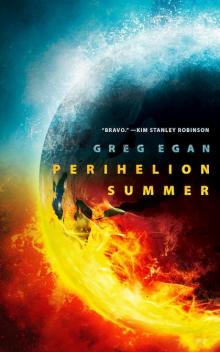 Perihelion Summer
Perihelion Summer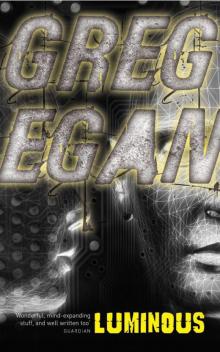 Luminous
Luminous